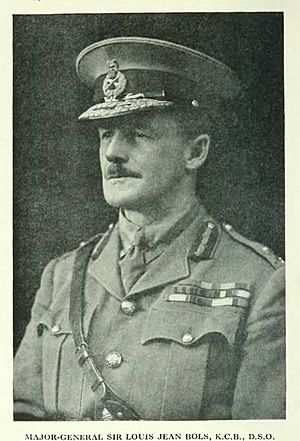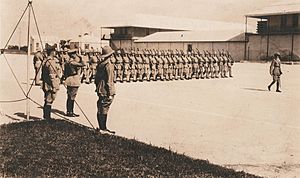Louis Bols facts for kids
Quick facts for kids
Sir Louis Jean Bols
|
|
|---|---|
 |
|
| Born | 23 November 1867 Cape Town, Cape Colony |
| Died | 13 September 1930 (aged 62) |
| Allegiance | |
| Service/ |
|
| Years of service | 1887–1920 |
| Rank | Lieutenant General |
| Unit | Devonshire Regiment |
| Commands held | 24th Division |
| Battles/wars | Chitral Expedition Second Boer War World War I |
| Awards | Knight Commander of the Order of the Bath Knight Commander of the Order of St Michael and St George Distinguished Service Order Mentioned in despatches (6) |
| Relations | Eric Bols (son) |
Lieutenant General Sir Louis Jean Bols (born November 23, 1867 – died September 13, 1930) was an important British Army General. He worked closely with General Edmund Allenby as his main helper, called a Chief of Staff, during World War I. He served on the Western Front in Europe and later in the Sinai and Palestine campaign in the Middle East. After the war, he became the Governor of Bermuda from 1927 until his death.
Contents
Early Life and Education
Louis Jean Bols was born in Cape Town, which was then part of the Cape Colony. He went to school in England at Lancing College and also in Canada at Bishop's College School.
Military Career Highlights

Bols began his military journey in 1887 when he joined the Devonshire Regiment as a second lieutenant. He quickly moved up the ranks. In the early 1890s, he served in British Burma, helping with operations in the Kachin Hills.
In 1895, he was part of the Chitral Relief Force. This force helped a princely state called Chitral. He became a captain in 1897.
The Second Boer War
When the Second Boer War started in 1899, Bols and his battalion went to South Africa. He served as the adjutant, a key administrative role, for his battalion throughout the war. He was involved in several important battles, including Colenso and the Relief of Ladysmith. For his brave service, he was recognized twice for his actions and received the Distinguished Service Order (DSO).
World War I and Beyond
At the start of World War I in 1914, Bols took command of the Dorsetshire Regiment. In 1915, during the Second Battle of Ypres, he led the 84th (Infantry) Brigade.
Later that year, he became the Chief of Staff for General Sir Edmund Allenby's Third Army. He worked with Allenby on the Western Front in 1916. Then, from 1917 to 1918, they served together in the Sinai and Palestine campaign in the Middle East.
Administrator of Palestine
From January to June 1920, Sir Louis Bols had a very important job. He was the Chief Administrator of Palestine. He was responsible for handing over control to Herbert Samuel, who became the first British High Commissioner of Palestine. Bols famously signed a document saying: "Received from Major-General Sir Louis J. Bols K.C.B.—One Palestine, complete."
Later Years and Governorship
After his time in Palestine, Bols became the General Officer Commanding the 43rd (Wessex) Infantry Division in 1920. From 1927 until his death, he served as the Governor of Bermuda. In this role, he was also the General Officer Commanding the army forces stationed there. He was also the colonel of the Devonshire Regiment from 1921 until he passed away.
Sir Louis Jean Bols died on September 13, 1930, at the age of 62. He was on leave from Bermuda at the time, staying in Bath, England.
Family Life
Sir Louis Bols was married to Augusta Blanche Strickland. They had two sons. One son, Eric Bols, also became a Major-General. Their other son, Maj. Kenneth Bols, sadly died in action during World War II.
 | Madam C. J. Walker |
 | Janet Emerson Bashen |
 | Annie Turnbo Malone |
 | Maggie L. Walker |

